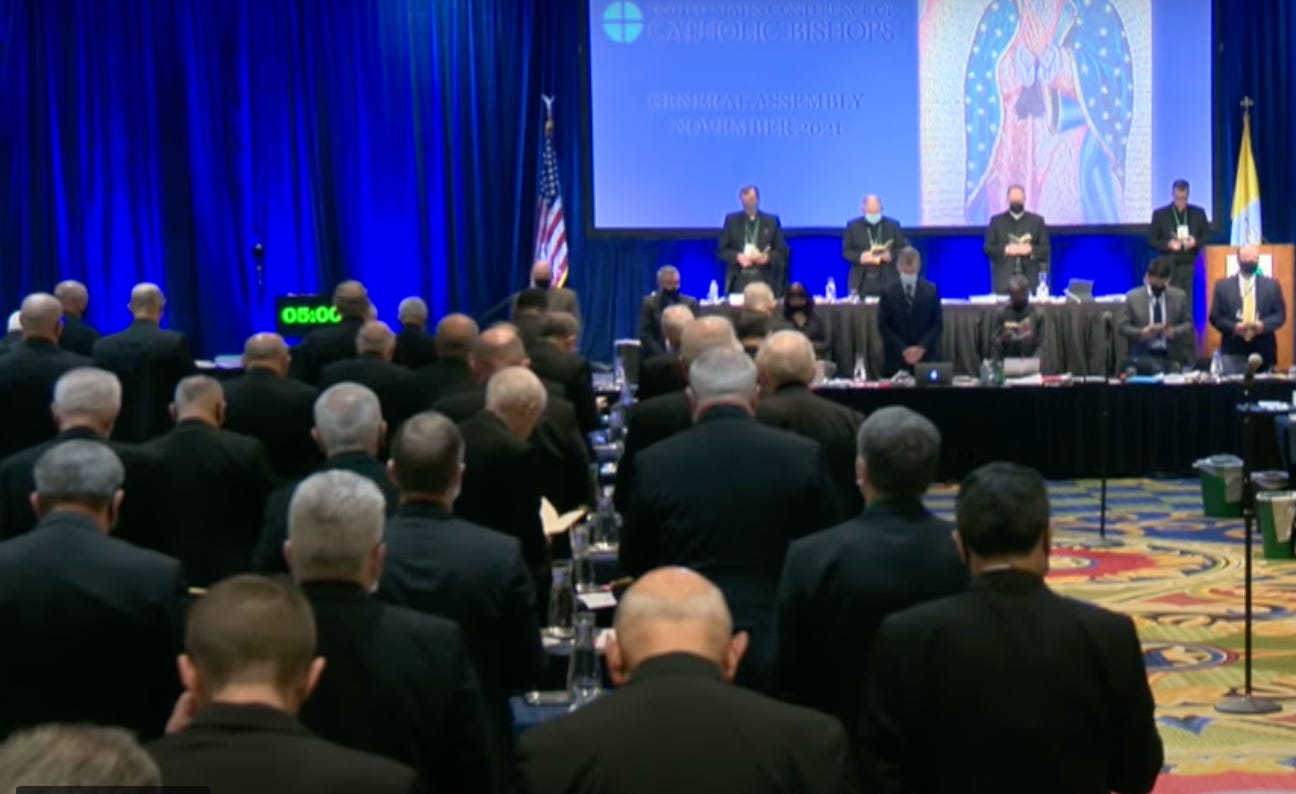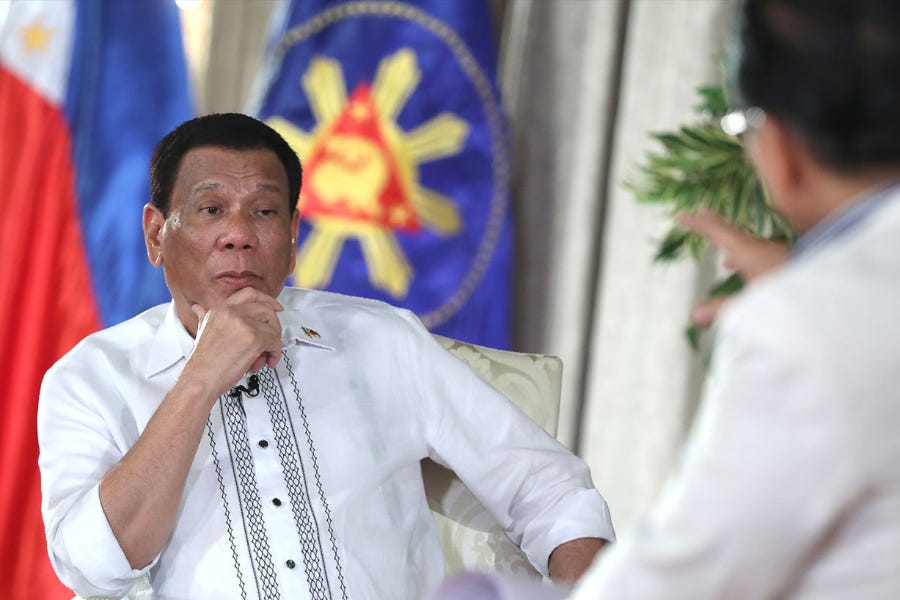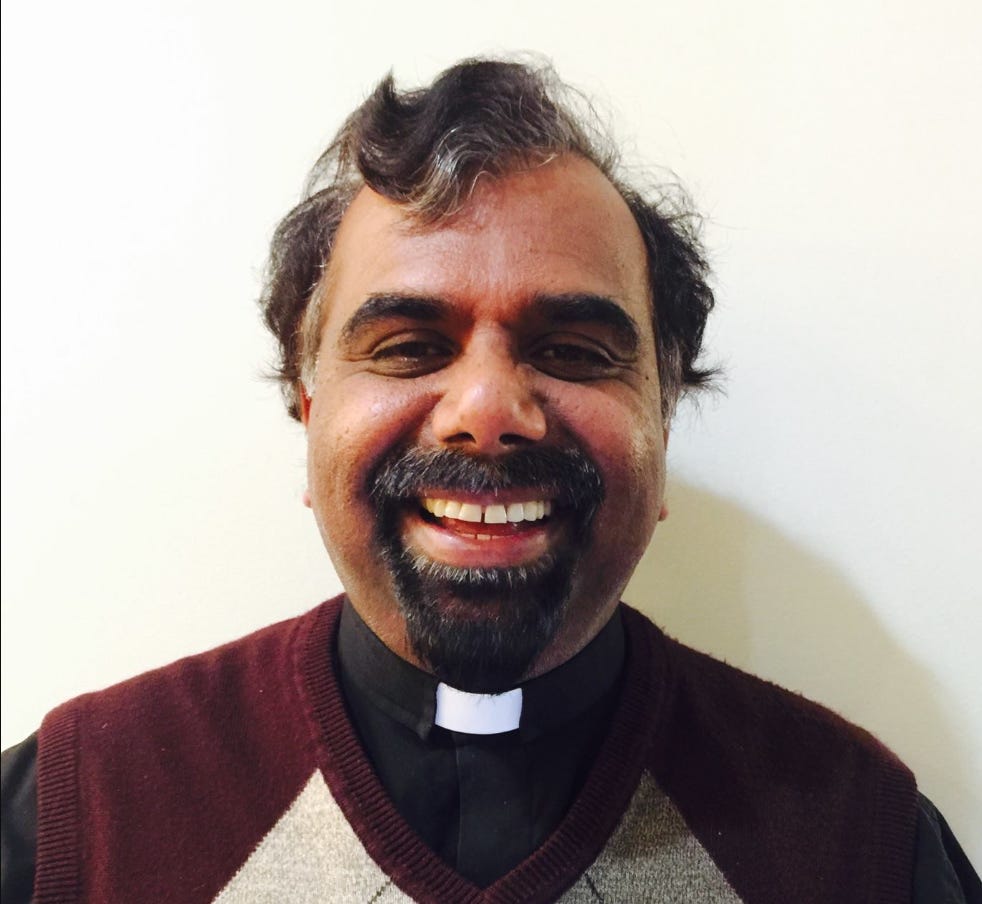On the second and final public day of the fall 2021 general assembly, the U.S. Conference of Catholic Bishops (USCCB) overwhelmingly approved a teaching document on the Eucharist from the conference’s doctrine committee.
Entitled The Mystery of the Eucharist in the Life of the Church, the document has been the subject of heated disagreement among the bishops in recent months. At the bishops’ June virtual meeting, the proposal to move forward with drafting the document prompted hours of vigorous debate, with the sharpest disagreements being raised over whether the document should discuss the problem of Catholic politicians opposing the Church’s moral teaching while continuing to receive Communion.
But the final public debate of the document on Wednesday was brief, and the text was approved 222-8. Several sources told The Pillar that the subject was discussed in greater length during the private executive sessions held Monday and Tuesday afternoon - a departure from the normal USCCB custom of holding executive sessions only after the conclusion of the public sessions. The final text does not mention the denial of communion to Catholic politicians who support abortion.
The bishops discussed several other topics Wednesday as well. They voted on a number of action items and listened to updates from various conference committees. Here’s a summary from the day:
Auxiliary Bishop Andrew Cozzens of Saint Paul and Minneapolis, who heads the evangelization and catechesis committee, updated the bishops on plans for the conference’s National Eucharistic Revival, which is slated to launch on June 19, 2022, the feast of Corpus Christi. The initiative is designed to promote devotion, love, and belief in the Eucharist, through collaboration with parishes, dioceses, schools, and religious organizations. It will include a study on belief in the Eucharist, a diocesan toolkit for Corpus Christi processions, and the commissioning of more than 50 “Eucharistic preachers” who can speak about the power of the Eucharist, Cozzens said. Blessed Carlo Acutis, an Italian teenager who was beatified earlier this year, will be the patron of the initiative for the first year. Acutis was known for his Eucharistic devotion and created a website cataloguing Eucharistic miracles. The second phase of the revival - the parish phase - will launch in June 2023, with the goal of spreading devotion to the Eucharist on the margins of society, including prisons and the southern U.S. border. The initiative will conclude with a National Eucharistic Congress in 2024, with the hope of gathering 80,000 people for prayer and talks on Eucharistic devotion in Indianapolis. The bishops on Wednesday voted in support of moving forward with the planning of the Eucharistic Congress.
The bishops approved the 2022 USCCB budget. They also voted to authorize a review of their child protection policies, ahead of their mandated review in 2025. In addition, they approved an update to the their 2003 guidelines for socially responsible investment, revisions to “National Statutes for the Catechumenate,” a resolution on diocesan financial reporting, a new translation of “Holy Communion and Worship of the Eucharistic Mystery Outside Mass,” and revised English and Spanish editions of the Order of Christian Initiation of Adults.
By a vote of 213-0, with one abstention, the bishops approved a petition asking the Holy See to add Mother Teresa of Calcutta to the U.S. liturgical calendar, as an optional memorial on September 5. They also voted in favor of advancing the canonization causes of three Americans:
Charlene Richard was a young girl in rural Louisiana. She lived just two weeks following a leukemia diagnosis at age 12, but her cheerful faith and desire to offer her sufferings for the salvation of others during that time made a strong impression on those around her. Bishop Douglas Deshotel of Lafayette praised Charlene as an example of redemptive suffering and noted that since her death in 1959, there have been multiple documented cases of her efficacious intercession.
Auguste ‘Nonco’ Pelafigue was a teacher in Cajun Louisiana who was dedicated to prayer and visiting the sick. Nonco had a devotion to the Sacred Heart of Jesus and became known for his acts of penance, up until his death in 1977. Bishop Deshotel noted that his life was characterized by charity, sacrifice, and simplicity- walking everywhere and living in a shed with only a single light bulb.
Joseph Dutton was a Union Army lieutenant and a convert to the Catholic faith. Born Ira Dutton in 1843, he was a Vermonter who fought in the Civil War. Bishop Richard Silva of Honolulu noted that he may have suffered from what today would be identified as PTSD. After a broken marriage and years of heavy drinking, Dutton converted to the Catholic faith, drawn in particular by the ideas of penance he found there. He took the name Joseph and traveled to Hawaii, where he ministered to lepers and those in need with St. Damien of Molokai.
Bishop Daniel Flores, chairman-elect of the Committee on Doctrine, gave an update on the Synod on Synodality. The Church is currently in the first phase of the three-year synod, which will culminate in a meeting of bishops from around the world at the Vatican in October 2023. As the first step of that process, dioceses are holding local listening sessions and consultations. Diocesan reports will then be merged into regional reports and then into a national report that will be submitted to the Vatican. Flores emphasized that the synodal path is one of listening, praying, and discerning together. He encouraged the bishops to deliberately invite people into listening and consultation sessions, including those who do not routinely participate in parish life, and the poor and marginalized. The USCCB has developed online resources to assist in the process, including aids for homilies and consultations.
The bishops heard updates from leaders of several Catholic ministries, including Catholic Relief Services, Catholic Charities, the Catholic Campaign for Human Development, and the Catholic Legal Immigration Network (CLINIC). In addition, several committees at the conference presented updates on their work:
Archbishop Nelson Pérez of Philadelphia, who heads the Committee on Cultural Diversity in the Church, gave an update on the committee’s “Journeying Together” process. For two years, the initiative has worked to create opportunities for dialogue and accompaniment for young adults and those who minister to them, particularly in the face of contemporary social issues including racial injustice protests and the effects of the Covid-19 pandemic. Some 1,600 people have participated in the process so far, about half of them young people. The initiative will host a national gathering in Chicago next June, before evaluating ways to implement concrete resolutions in the coming years.
Archbishop Salvatore Cordileone of San Francisco, chair of the Committee on Laity, Marriage, Family Life, and Youth, gave a presentation on the bishops’ national Pastoral Framework for Marriage and Family Life Ministry in the United States: Called to the Joy of Love. The framework seeks to help offer pastoral approaches for dioceses, parishes, and ministries to address the unique complexities and challenges of contemporary marriage and family life. The committee is preparing resources for families, tools for dioceses, and a website to help educate and fortify couples and families around the country. There are also funds available to help dioceses implement the elements of the framework.
Archbishop Joseph Naumann of Kansas City in Kansas, head of the Committee on Pro-Life Activities, shared an update on Walking with Moms in Need, a parish-based program to serve pregnant and parenting mothers by connecting them with resources and supporting local pregnancy centers. He said the initiative seeks to change the pro-life conversation in the country and demonstrate the Church’s commitment to women and children, countering the false narrative that the Church condemns abortion without providing alternatives. The program can also be a means of bridging the partisan divide and replacing it with pastoral unity, he said. Naumann encouraged bishops who do not already have the program present in their dioceses to consider it.
Auxiliary Bishop Mario Dorsonville-Rodriguez of Washington, who leads the Committee on Migration, discussed the document Immigration Reform and the Church’s Voice: Understanding the Problem and Seeking Solutions, which was recently sent to the bishops. He encouraged them to read the document carefully, looking at the statistics and facts it presents, and then to renew their commitment to pray, advocate, and accompany the migrant communities in their own dioceses.




